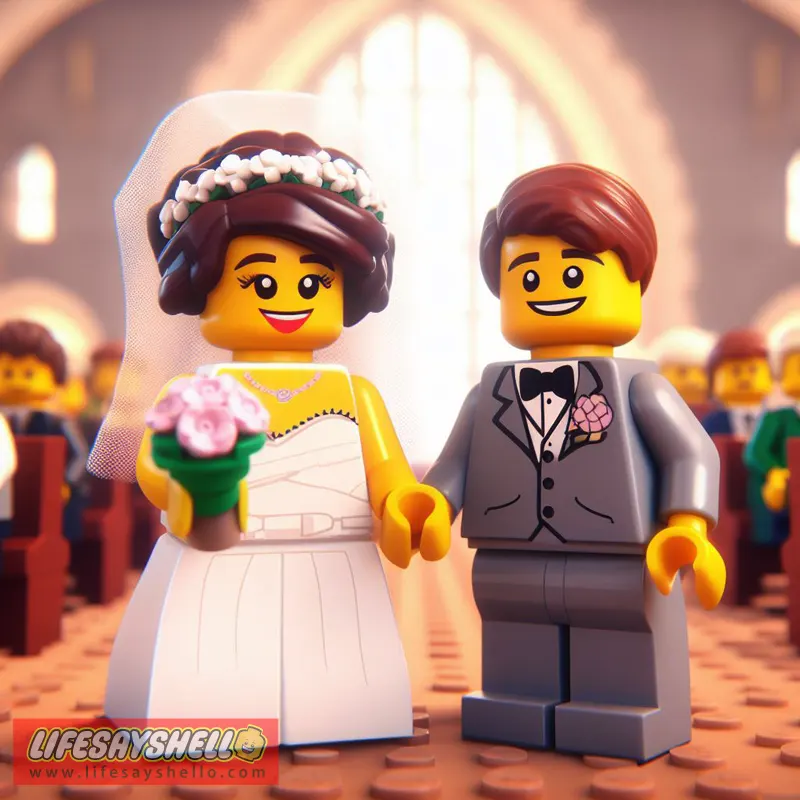The Changing Trends: Examining the Average Age for Marriage in the U.S.

Getting married used to be something people did in their early twenties, but times have changed. Over the past few decades, the average age for marriage in the United States has been steadily climbing.
Both women and men are waiting longer to tie the knot, a trend that reflects shifting cultural norms around relationships and family.
Millennials Are in No Rush To Marry
In today’s society, the 20s are seen as a time for self-discovery and adventure. More people are prioritizing their education and career goals over settling down. The median age for a first marriage is now over 28 years old for women and 30 for men. Back in the 1950s, the average woman married at age 20 and the average man wed at 23. Clearly, the timeline for marriage has been prolonged.
Financial instability is another huge factor driving up the average age for marriage. Millennials came of age during the Great Recession and many are saddled with student loan debt. It can be difficult to afford a wedding and feel financially ready for that commitment while still paying off debts and establishing yourself in a career. Our economic realities mean marrying young is simply not feasible for most of us.
Average Age for Marriage By Gender
Over the past 50 years, the age gap between men and women saying “I do” for the first time has also narrowed significantly. Let’s look at the numbers:
Women Are Marrying Later
- In the 1950s, the average age for first marriage for women was about 20 years old.
- By 2018, the median age at first marriage had risen to 28 years old.
- In 2021, the average age of first marriage for women peaked at 30.2 years old.
The days when women typically settled down with their high school sweetheart are long gone. More women are pursuing college degrees and careers before thinking about marriage. As gender roles evolve, women are feeling less pressure to marry young and start families right away. Financial independence enables them to be selective and wait for the right partner.
Men Are Also Waiting Longer To Marry
- In the 1950s, the average age for marriage for men was about 23 years old. This dropped to a low of 22 years old in the 1970s.
- Starting in the 1980s, the average age for men to marry began climbing up.
- By 2021, men were tying the knot for the first time at an average of 30.2 years old.
One driving factor of men marrying later is that they are staying in school longer and taking more time to establish themselves professionally. Some hypothesize that video games, sports, and bromance culture have made men less eager to give up their independence. With gender norms in flux, men face less societal pressure to settle down at a young age.
Average Age for Marriage By Race
There are also noticeable differences in the average age for first marriage across racial groups in the U.S. Here’s a breakdown of the numbers:
Black Women and Men Marry Later
- Black women: The median age at first marriage is around 30 years old.
- Black men: The median age at first marriage is around 32 years old.
Systemic economic disparities make it harder for many African Americans to attain the financial stability desired before marriage. College enrollment rates also remain lower among Black men and women compared to other racial groups. With fewer college graduates, the average marriage age trends younger.
Hispanic Women Marry Youngest
- Hispanic women: The median age at first marriage is around 27.5 years old.
Cultural traditions and religious beliefs in the Hispanic community emphasize marriage and family. Hispanic women often feel familial and social pressure to marry at a young age compared to their non-Hispanic peers.
White Men and Women In The Middle
- White women: The median age at first marriage is around 26 years old.
- White men: The median age at first marriage is around 29.4 years old.
The marriage age for Whites falls somewhere between the higher averages for Black Americans and the lower averages for Hispanic groups. This reflects the mix of cultural norms and economic factors influencing White millennials today.
Why Are Millennials Waiting To Marry?
It’s clear the timeline for walking down the aisle has changed dramatically in recent decades. But what’s driving this shift towards older marriages? Here are some of the key cultural factors:
Pursuing Education and Careers
Millennials are the most educated generation in history. More young adults are going to college and pursuing graduate degrees than ever before. This extends their schooling well into their 20s.
Launching a career is also a priority for today’s youth. They want financial security before considering marriage. This pragmatic mindset pushes marriage later down the to-do list.
Decline of Stigma Around Cohabitation
In the past, living together before marriage was taboo. Couples were expected to tie the knot fast, often after brief courtships.
Today, most couples cohabitate for years before getting engaged or married. There’s less urgency when you can enjoy living together without the formality of marriage.
Delayed Childbearing
The average age for first-time mothers is now over 26 years old. Millennial women are putting off childbearing to focus on their career and enjoy married life. This also enables older marriages.
Economic Constraints
As mentioned, recession-era financial challenges have made marrying young less feasible. Paying off student loans and credit card debt is the priority. Saving up to pay for a wedding or buy a house also takes time.
Millennials believe marriage is something you do when you’ve checked off other boxes, like an education, career, financial foundation, and life experiences. Essentially, we are holding marriage to a higher standard than previous generations.
Pros and Cons of Older Marriages
Postponing “I do” until your late 20s or 30s has its upsides and downsides. Let’s examine some of the key pros and cons:
Pros
Maturity - With age comes wisdom (hopefully). Marrying later means you likely have a better sense of who you are and what you want in a life partner.
Financial Stability - Older newlyweds tend to be more financially secure. Established careers and savings provide a strong foundation.
Life Experience - Delaying marriage allows more time for travel, hobbies, friendships, and self-discovery. You can avoid “mid-life crisis” regrets.
Cons
Fertility Declines - Postponing parenthood too long can make it harder for couples to conceive. Older marriages often rely more on assisted reproductive technologies.
Settling For Less - Some worry that the pool of quality partners shrinks as you age. People start pairing off in their 20s.
Shorter Time Together - Marrying later means you may have fewer years before age-related health issues strike you or your spouse.
Despite these concerns, most marriage experts emphasize that getting to know yourself, your partner, and what you want in life sets couples up for long-term success, however old they may be.
The Verdict: Don’t Rush To The Altar
The average age for first marriage will likely continue creeping up in America. This reflects positive cultural shifts, like women’s empowerment and the desire to achieve financial independence.
Of course, getting married at 22 or 32 doesn’t determine marital success or failure. But marrying older based on mutual love, not external pressure, is key. Millennials are wise to invest time developing themselves before joining lives with a lifelong partner.
While the “right” age varies by individual, understand that your 20s are a time for self-discovery. If marriage happens later in life due to pursuing your goals, so be it. Never settle just to check society’s box. The most important thing is to commit when you find someone who complements you and makes you genuinely happy.




Comments